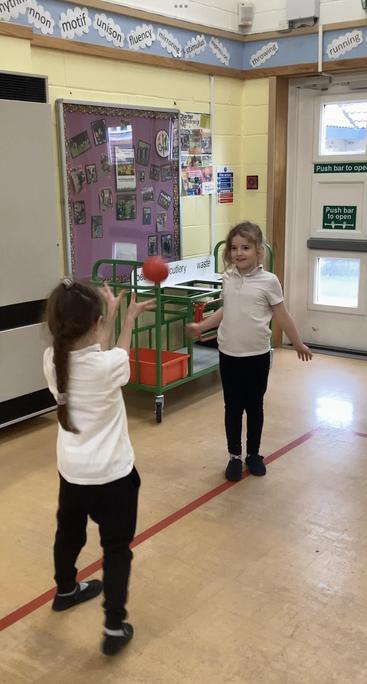Year 2

Children will learn and develop the following skills in PE:
Dance
Copy, remember and repeat actions.
Create a short motif inspired by a stimulus.
Change the speed and level of their actions.
Use simple choreographic devices such as unison, canon and mirroring.
Use different transitions within a dance motif.
Move in time to music.
Improve the timing of their actions.
Compete and perform
Perform sequences of their own composition with coordination.
Perform learnt skills with increasing control.
Compete against self and others.
Evaluate
Watch and describe performances, and use what they see to improve their own performance.
Talk about the differences between their work and that of others.
Gymnastics
Copy, explore and remember actions and movements to create their own sequence.
Link actions to make a sequence.
Travel in a variety of ways, including rolling.
Hold a still shape whilst balancing on different points of the body.
Jump in a variety of ways and land with increasing control and balance.
Climb onto and jump off the equipment safely.
Move with increasing control and care.
Rolls
Log roll (controlled)
Curled side roll (egg roll) (controlled)
Teddy bear roll (controlled)
Rocking for forward roll
Crouched forward roll
Jumps
Straight jump
Tuck jump
Jumping jack
Half turn jump
Cat spring
Cat spring to straddle
Vault – with springboard and vault or other suitable raised platform, e.g. gymnastics table
Hurdle step onto springboard
Straight jump off springboard
Tuck jump off springboard.
Handstands, Cartwheels and Round-offs
Bunny hop
Front support wheelbarrow with partner
T-lever
Scissor kick
Travelling & Linking Actions
Tiptoe, step, jump and hop
Hopscotch
Skipping
Galloping
Straight jump half-turn
Shapes and Balances
Standing balances
Kneeling balances
Large body part balances
Balances on apparatus
Balances with a partner
Pike, tuck, star, straight, straddle shapes
Front and back support
Compete and perform
Perform sequences of their own composition with coordination.
Perform learnt skills with increasing control.
Games
Striking and Hitting a Ball
Strike or hit a ball with increasing control.
Learn skills for playing striking and fielding games.
Position the body to strike a ball.
Throwing and Catching a Ball
Throw different types of equipment in different ways, for accuracy and distance.
Throw, catch and bounce a ball with a partner.
Use throwing and catching skills in a game.
Throw a ball for distance.
Use hand-eye coordination to control a ball.
Vary types of throw used.
Travelling with a ball
Bounce and kick a ball whilst moving.
Use kicking skills in a game.
Use dribbling skills in a game.
Passing a ball
Know how to pass the ball in different ways.
Using Space
Use different ways of travelling at different speeds and following different pathways, directions or courses.
Change speed and direction whilst running.
Begin to choose and use the best space in a game.
Attacking and Defending
Begin to use and understand the terms attacking and defending.
Use at least one technique to attack or defend to play a game successfully.
Tactics and Rules
Understand the importance of rules in games.
Use at least one technique to attack or defend to play a game successfully.
Compete and perform
Perform sequences of their own composition with coordination.
Perform learnt skills with increasing control.
Compete against self and others.
Evaluate
Watch and describe performances, and use what they see to improve their own performance.
Talk about the differences between their work and that of others.
Athletics
Running
Run at different paces, describing the different paces.
Use a variety of different stride lengths.
Travel at different speeds.
Begin to select the most suitable pace and speed for distance.
Complete an obstacle course.
Vary the speed and direction in which they are travelling.
Run with basic techniques following a curved line.
Be able to maintain and control a run over different distances.
Jumping
Perform and compare different types of jumps: for example, two feet to two feet, two feet to one foot, one foot to same foot or one foot to opposite foot.
Combine different jumps together with some fluency and control.
Jump for distance from a standing position with accuracy and control.
Investigate the best jumps to cover different distances.
Choose the most appropriate jumps to cover different distances.
Know that the leg muscles are used when performing a jumping action.
Throwing
Throw different types of equipment in different ways, for accuracy and distance.
Throw with accuracy at targets of different heights.
Investigate ways to alter their throwing technique to achieve greater distance.
Compete and perform
Perform learnt skills with increasing control.
Compete against self and others.
Evaluate
Watch and describe performances, and use what they see to improve their own performance.
Talk about the differences between their work and that of others.